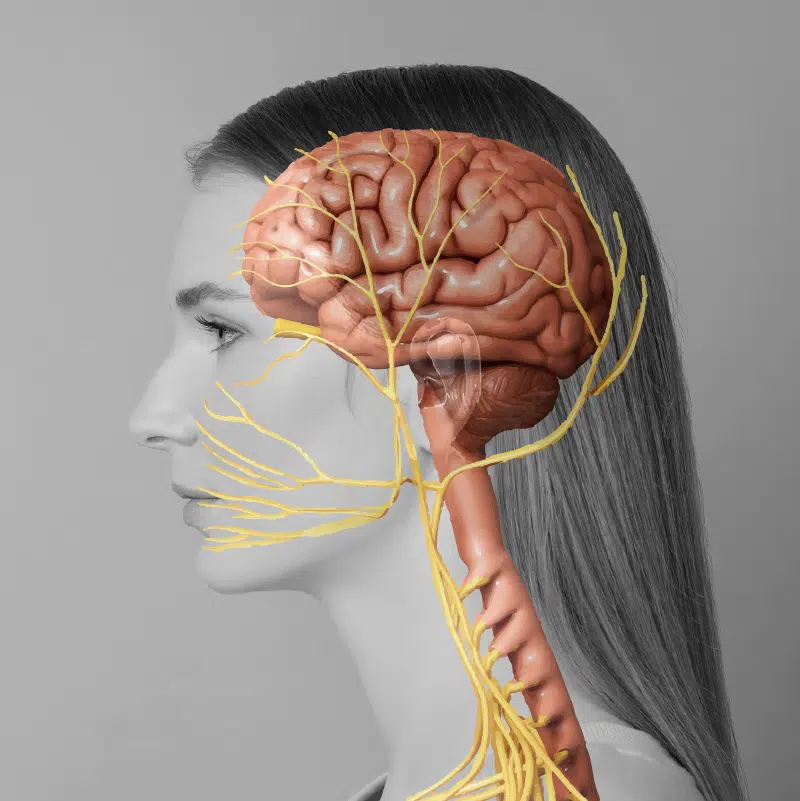In the intricate symphony of our nervous system, a key conductor has stepped into the limelight—the Vagus Nerve. It’s not just a buzzword; it’s the new “IT” thing in health and wellness, and for good reason. Let’s delve into what these nerves are, their importance, and how activating them can be a game-changer for stress reduction, anxiety alleviation, and overall well-being.
Understanding the Vagus Nerve:
The vagus nerve, the longest of the cranial nerves, winds its way through the body like a cosmic highway, connecting the brain to various organs. Its name, derived from the Latin word for “wandering,” aptly describes its meandering path and extensive reach. But what makes the vagus nerve truly fascinating is its role in regulating the autonomic nervous system.
Importance of the Vagus Nerve:
The vagus nerve is the unsung hero of balance in our bodies. It oversees the delicate dance between the sympathetic (fight-or-flight) and parasympathetic (rest and digest) branches of the autonomic nervous system. This dual control mechanism influences heart rate, digestion, respiratory function, and even mood, making the vagus nerve a linchpin for overall health.
Activating the Vagus Nerve: The Golden Ticket to Wellness:
Activating the vagus nerve may sound complex, but it doesn’t require much! Several practical approaches can stimulate this powerhouse nerve and unlock a cascade of benefits for your well-being:
- Deep Breathing Exercises: Engage in intentional deep breathing. Slow, diaphragmatic breaths signal to the vagus nerve that it’s time to switch into relaxation mode.
- Cold Exposure: A bracing splash of cold water or a chilly shower can kickstart the vagus nerve, promoting resilience and reducing stress. Or perhaps some Cryotherapy?
- Physical Exercise: Regular physical activity, especially activities like yoga or tai chi, has been shown to enhance vagal tone, improving the efficiency of the vagus nerve.
Vagus Nerve: The Wellness Marvel:
Why has the vagus nerve become the talk of the town in health and wellness circles?
1. Stress Reduction:
Activating the vagus nerve prompts the parasympathetic nervous system to counterbalance stress responses, leading to a calmer and more centered state.
2. Anxiety Alleviation:
The vagus nerve’s influence extends to mood regulation areas in the brain, providing a natural antidote to anxiety.
3. Overall Well-being:
Beyond stress and anxiety, vagus nerve stimulation positively impacts heart health, inflammation levels, and digestive function, contributing to holistic well-being.
Complementary Therapies: Enhancing the Vagus Nerve Experience:
- Cranial Sacral Therapy: Gentle manipulation of the skull and spine aligns with the vagus nerve’s role, enhancing the flow of cerebrospinal fluid and promoting relaxation.
- Massage: Hands-on massage therapy targets muscle tension, promoting relaxation and serving as a catalyst for vagal activation.
- Sound Healing Therapy: Harmonious vibrations resonate with the vagus nerve, offering a unique avenue for relaxation and stress reduction.
By incorporating these simple activation techniques and embracing complementary therapies like Cranial Sacral Therapy, massage, and Sound Healing, you embark on a journey toward reduced stress, diminished anxiety, and an overall uplifted sense of wellness.


